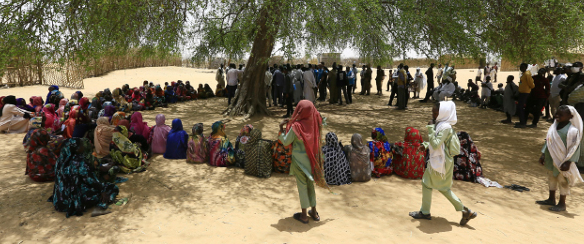With an estimated 300 million people needing humanitarian assistance and protection in 2024, understanding which interventions are most effective is more important than ever. But how do we find evidence on interventions to inform our decision-making and understanding?
In 2022, 3ie worked closely with the Humanitarian Assistance Evidence Cycle Activity (HAEC) to produce an evidence gap map (EGM) on food security interventions in humanitarian settings. EGMs provide a visual representation of the rigorous evidence that exists within a certain sector.
This EGM included 146 impact evaluations and 17 systematic reviews on food security interventions in the humanitarian sector. By providing the compiled evidence in an interactive format, the EGM enables users to identify both concentrations and gaps in the existing evidence base. While this resource aims to inform decision-making and highlight areas to focus new impact evaluations, since it was published, the world has continued to face ongoing and new humanitarian challenges, from conflicts to climatic emergencies.
Expanding our evidence base
During this time, HAEC funded six new impact evaluations of emergency food security programs carried out by USAID Bureau for Humanitarian Assistance (BHA)-funded implementing partners. This included two studies in West Africa (Niger and Nigeria) and four studies in Latin America (Colombia, Honduras, and Guatemala). These studies have provided a wealth of new information and insights, filling clear evidence gaps.
To share this information further, 3ie and HAEC are excited to update the EGM to include these and other studies that have been published in the past two years. Together, we’re working to expand the sector’s understanding of what works in emergency and humanitarian contexts to ensure the effective use of available resources.
Through HAEC’s research experience, the team observed that research generated from a strong collaboration between the research partner and implementing partner was most likely to drive changes in implementation approaches. These partnerships ensure that the evidence produced is directly relevant to the operational needs and constraints of humanitarian interventions. By working closely together, partners and researchers ensure that their findings are not only rigorous but also practically applicable, leading to more responsive and effective humanitarian programs.
However, these operational-level research initiatives often go unpublished—and this is where HAEC and 3ie need your help!
Updating the evidence base — how you can help
3ie and HAEC are seeking input from policymakers, researchers, and practitioners to share relevant impact evaluations or systemic reviews in emergency and humanitarian contexts — particularly those that are unpublished, forthcoming, or only found in grey literature.
Your contributions will help fill critical gaps in our understanding and drive improvements in humanitarian program design and implementation. Join us in making a difference by submitting your studies, ensuring that every dollar spent on humanitarian aid is as effective as possible.
The original EGM report provides greater details on the exact type of studies included within the EGM. They fall under the following categories:
- Early warning systems
- Interventions pre-arranging household finance for disasters
- Food, cash, and other in-kind transfers
- Agriculture and livestock interventions
- Nutrition interventions
- Market-based recovery interventions
- Water security interventions
If you know of any studies that might be relevant to our map, please comment below, use this Google form to submit a paper, or contact Cem Yavuz.
Study suggestions will be accepted through 31 August 2024.
This blog is co-published with Humanitarian Assistance Evidence Cycle Activity (HAEC). The original blog can be found here.









